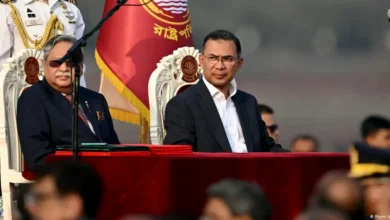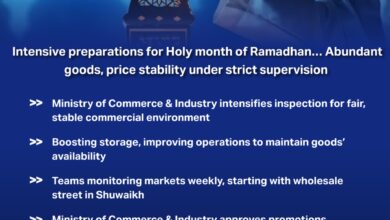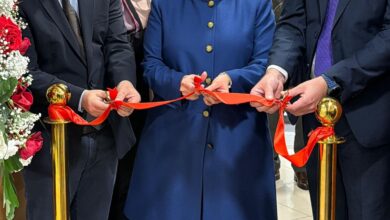Kuwait’s private sector steps up at OPEC Forum with vision for low-carbon leadership
“HUB2ENERGY CEO credits H H the Amir Sheikh Mishal and Oil Minister Al-Roumi for empowering private innovation in energy transition; while as António Campos says, the world needs more energy but what matters is ‘how we produce it’,”.

The Times Kuwait Report
As the global energy community convened at Vienna’s historic Hofburg Palace for the 9th OPEC International Seminar, Kuwait’s private sector assumed a proactive role in shaping discussions on the future of energy.
Among the contributors to this high-level forum was HUB2ENERGY, a Kuwait-based company pioneering innovation in energy systems, decarbonization, and technology integration.

Representing the company was its Co-Founder and CEO, António Azevedo Campos, who highlighted Kuwait’s strategic direction, attributing it to the leadership of H.H. the Amir Sheikh Mishal Al-Ahmad Al-Jaber Al-Sabah, and H.E. Tariq Al-Roumi, Minister of Oil. “Their vision,” Campos stated, “has created space for the private sector to contribute decisively to the country’s energy future.”
The two-day seminar, held on July 9–10, also witnessed the unveiling of OPEC’s two flagship publications: the World Oil Outlook 2025 (WOO) and the Annual Statistical Bulletin (ASB) 2025, reinforcing OPEC’s role in providing long-term strategic foresight.

“This Outlook is more than a report — it’s a long-range signal,” Campos told The Times Kuwait. “Under the direction of H.E. Haitham Al Ghais, OPEC is not only providing stability — it’s restoring relevance. The combination of vision, discipline, and evidence-based planning gives both governments and markets a much-needed anchor in volatile times.”
On the Annual Statistical Bulletin, he added, “With so much noise in the system, transparency matters more than ever. The ASB gives us plenty of data — but what truly matters is how that data informs strategy.”

Kuwait’s approach to energy is not reactive but decisively proactive. As reaffirmed by Minister of Oil Tariq Al-Roumi, the nation remains firmly committed to the OPEC+ voluntary production cuts as a mechanism to stabilize markets.
“The strategy reflects a disciplined and calculated approach, where increasing oil production also reflects vision — aimed at reinforcing investor confidence and strengthening the long-term balance of global oil markets,” he stated.

Campos pointed out that this clarity provides a robust platform for both public and private sector collaboration. Reiterating Kuwait’s goal of reaching a production capacity of 4 million barrels per day, Campos stressed that higher production does not imply higher emissions.
“Boosting production doesn’t have to mean boosting emissions,” he explained. “As Sheikh Nawaf Al-Sabah has made clear, Kuwait is committed to becoming one of the least carbon-intensive producers globally. That’s the new benchmark — and Kuwait is rising to meet it.”

Referencing the WOO 2025, Campos cited Dr. Ayed S. Al-Qahtani, Director of OPEC’s Research Division: “The WOO doesn’t pretend to predict the future — no one can, except Allah,” Campos quoted. “But it gives us a shared factual foundation to debate, plan, and act.”
According to the Outlook, global primary energy demand is projected to rise by 23% by 2050, with non-OECD countries like Kuwait playing a central role in meeting that growth. “This kind of leadership is unlocking the right doors,” Campos said. “It’s not just attracting deeper international investment — it’s enabling strategic co-development pathways that align global capital with Kuwait’s long-term energy priorities.”

Campos is also engaging in international dialogue. In addition to his role at HUB2ENERGY, he was recently appointed Portugal’s World Advisor for Energy and the Middle East by the Portuguese Diaspora Council under the High Patronage of the President of the Portuguese Republic.
“It’s both an honor and a responsibility,” he remarked. “This is about strengthening Portugal’s role in global energy innovation — and forging real bridges between the EU and the Gulf. Not just in trade, but through shared infrastructure, knowledge flows, and partnerships aligned with mutual ambitions.”

As the European Union prepares to launch the Industrial Decarbonization Accelerator Act (IDAA), Campos emphasized the opportunity for EU-GCC convergence. “This isn’t about exporting technology — it’s about co-developing systems. The Gulf brings space, scale, and speed. Europe contributes capital discipline, certification, and industrial clustering. It’s a perfect fit — if we build it together.”
He added candidly, “Let’s be honest — in 2024, Europe still imported 6.3 million barrels of oil and 36.8 bcm of gas. That’s not energy independence — that’s managed dependency. What matters now isn’t how much is needed, but how it’s produced and how it’s verified. So, let’s manage it well — with transparency, strategy, and cooperation.”
According to Campos, this moment represents a turning point for Europe. With a new Commission focusing on defense capabilities and industrial competitiveness, climate policy is being recalibrated. “This is not about lowering ambition,” he said. “It’s about raising realism. Europe is moving from ideology to execution — and that opens the door to more grounded, cross-border energy strategies.”
The WOO 2025 reinforces this narrative, framing Europe’s path as part of a broader “energy trilemma” — a necessary rebalancing of emissions, affordability, and security. It emphasizes that hydrocarbons are not being eliminated, but redefined within a low-carbon, transparent, performance-driven framework.
Campos noted demographic shifts as further proof of this reorientation. With OECD Europe’s population forecast to decline from 590 million in 2023 to 577 million by 2050, he argued that demand would persist, but with heightened scrutiny. “Demand won’t disappear. But what Europe will demand — and what the Gulf must deliver — is accountability, low-carbon performance, and operational excellence.”
Highlighting Kuwait’s upstream performance, Campos stated, “We reached 3.5 million barrels per day while maintaining one of the lowest upstream carbon intensities in OPEC+. That’s the kind of partnership Europe needs — strategic, clean, and evidence-based.”
Looking ahead to COP30, Campos remarked, “Europe’s net-zero leadership and the Gulf’s production leadership are not in conflict — they’re complementary. If we align around measurable climate outcomes, shared infrastructure, and trusted certification, we can build a carbon economy that works across borders.”
Responding to OPEC Secretary General Haitham Al-Ghais’s call for $17.4 trillion in oil infrastructure investment by 2050, Campos stated, “According to OPEC’s own projections, the oil sector will require roughly $18.2 trillion in cumulative investment by 2050 — up from $17.4 trillion just a year ago.
But the real message here is strategic: investment in oil and gas isn’t a rejection of energy transitions — it’s a safeguard for stability during it. Energy security and transition must go hand in hand. Ignore one, and the other fails.”
The WOO 2025 clearly projected that global oil demand is set to rise steadily to nearly 123 million barrels per day by 2050, driven by population growth and economic development in the Global South.
Campos welcomed the inclusion of Brazil in this year’s Outlook and aligned himself with the message delivered by Ambassador André Aranha Corrêa do Lago, COP30 President-Designate, who stated during the OPEC seminar, “There is no progress for humanity without deep, rapid, and sustained cooperation among all countries.”
Ambassador Corrêa do Lago emphasized climate finance and execution as the defining issues for COP30, advocating for mobilizing $1.3 trillion per year by 2030.
Campos supported this view: “This is no longer theory. Emissions must fall — but energy must rise. That’s the new equation. And it begins with full transparency — in carbon markets, in methodologies, in delivery.”
He continued, “Carbon markets must be real — and that starts with clarity: not just on metrics, but on monitoring, verification, and trust. Transparency isn’t a luxury. It’s the currency of credibility.”
He concluded that Kuwait is well-positioned to play a major role at COP30: “Kuwait has the assets, the ambition, and now the platform to contribute meaningfully — not by following, but by co-defining solutions that serve both global climate goals and regional priorities.”
At HUB2ENERGY, carbon capture, utilization, and storage (CCUS) is not a future concept — it is an active priority. Campos revealed that the company is already working with national stakeholders to create bankable carbon infrastructure adapted to local needs.
“Our approach starts with geological certainty,” he said. “We leverage advanced subsurface diagnostics — from biostratigraphy to seal integrity — to map viable storage zones and build credible CCUS business cases.”
Campos emphasized CCUS as a force multiplier rather than a rival to renewables. “It enables hydrogen scale-up, supports negative emissions, and decarbonizes the sectors we can’t electrify. This isn’t about choosing between green and grey — it’s about building energy systems that are real, regional, and ready.”
The company is also pioneering a Gulf-adapted Direct Air Capture platform, integrated with routes like SAF, enhanced oil recovery, algae-based CO₂, and e-methanol. “It’s scalable. It’s climate-relevant. And above all, it’s backed by a clear business case,” he affirmed.
Campos concluded with a clear message: “The world needs more energy, not less. What matters is how we produce it, how we prove it, and how we plan for the long term. OPEC is stepping up, not just to supply energy, but to decarbonize it and lead with responsibility.”
The call was for pragmatic leadership — scaling CCUS, hydrogen, low-emission fuels, geothermal, and Power-to-X solutions, while strengthening public–private partnerships across borders and blocs.
The OPEC theme — “Charting Pathways Together: The Future of Global Energy” — has already begun. With actors like HUB2ENERGY at the table, Kuwait’s private sector is not merely present in the global energy conversation — it is actively shaping what comes next.











